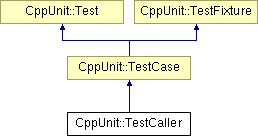
| CppUnit project page | FAQ | CppUnit home page |
#include <TestCaller.h>
Inheritance diagram for CppUnit::TestCaller:

Public Methods | |
| TestCaller (std::string name, TestMethod test) | |
| TestCaller (std::string name, TestMethod test, Fixture &fixture) | |
| TestCaller (std::string name, TestMethod test, Fixture *fixture) | |
| ~TestCaller () | |
Protected Methods | |
| void | runTest () |
| All the work for runTest is deferred to subclasses. More... | |
| void | setUp () |
| \brief Set up context before running a test. More... | |
| void | tearDown () |
| Clean up after the test run. More... | |
| std::string | toString () const |
| Returns the name of the test case instance. More... | |
Private Types | |
| typedef void(Fixture::* | TestMethod )() |
Private Methods | |
| TestCaller (const TestCaller &other) | |
| TestCaller & | operator= (const TestCaller &other) |
Private Attributes | |
| bool | m_ownFixture |
| Fixture * | m_fixture |
| TestMethod | m_test |
A test caller provides access to a test case method on a test fixture class. Test callers are useful when you want to run an individual test or add it to a suite. Test Callers invoke only one Test (i.e. test method) on one Fixture of a TestFixture.
Here is an example:
class MathTest : public CppUnit::TestFixture {
...
public:
void setUp();
void tearDown();
void testAdd();
void testSubtract();
};
CppUnit::Test *MathTest::suite() {
CppUnit::TestSuite *suite = new CppUnit::TestSuite;
suite->addTest( new CppUnit::TestCaller<MathTest>( "testAdd", testAdd ) );
return suite;
}
You can use a TestCaller to bind any test method on a TestFixture class, as long as it accepts void and returns void.
|
|||||
|
|
|
||||||||||||||||
|
Constructor for TestCaller. This constructor builds a new Fixture instance owned by the TestCaller.
|
|
||||||||||||||||||||
|
Constructor for TestCaller. This constructor does not create a new Fixture instance but accepts an existing one as parameter. The TestCaller will not own the Fixture object.
|
|
||||||||||||||||||||
|
Constructor for TestCaller. This constructor does not create a new Fixture instance but accepts an existing one as parameter. The TestCaller will own the Fixture object and delete it in its destructor.
|
|
|||||||||
|
|
|
||||||||||
|
|
|
||||||||||
|
|
|
|||||||||
|
All the work for runTest is deferred to subclasses.
Reimplemented from CppUnit::TestCase. |
|
|||||||||
|
\brief Set up context before running a test.
Reimplemented from CppUnit::TestFixture. |
|
|||||||||
|
Clean up after the test run.
Reimplemented from CppUnit::TestFixture. |
|
|||||||||
|
Returns the name of the test case instance.
Reimplemented from CppUnit::TestCase. |
|
|||||
|
|
|
|||||
|
|
|
|||||
|
|
|
|
hosts this site. |
Send comments to: CppUnit Developers |